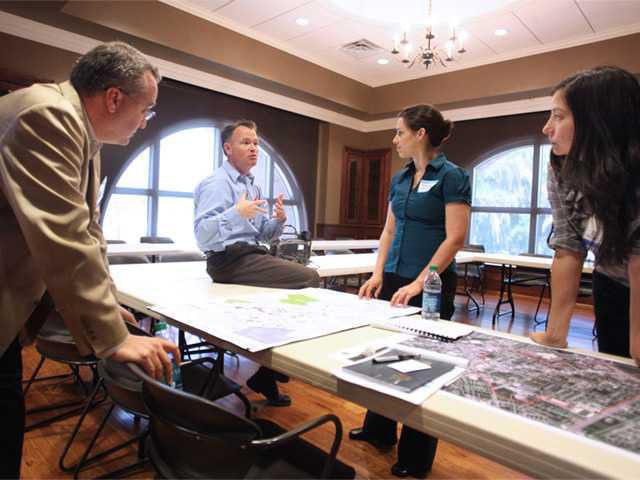A three-day planning forum united development stakeholders and senior care providers last week to address planning needs for an aging community.
The Coastal Regional Commission sponsored the Hinesville Community for All Ages Charrette, which ran Tuesday through Thursday at Hinesville City Hall.
Prior to the event, facilitators and sponsors evaluated the effectiveness of local plans to accommodate a boom in the population of those 65 and older, as the coastal Georgia population is expected to increase 51 percent by 2030, with the most significant jumps among those 70 and older.
“Livable communities, lifelong communities, aging in place … it’s really about creating a place, creating a neighborhood, creating policy and systems that allow people to age in place — to stay in their homes, stay in their neighborhoods for as long as they desire,” said Shawn Bliss, facilitator with Prosser Hallock consulting firm.
The forum’s Tuesday session allowed stakeholders to weigh in on development within a study area in downtown Hinesville study area, focusing on the Memorial Drive corridor, which already has several basic services within a half mile.
On Wednesday, senior citizens and those who provide care to seniors gathered with transportation and planning directors to talk about needs.
Senior Citizens Inc. employee Patti Lyons said a major challenge is bridging the gap between pedestrian communities and the county’s rural areas.
“We’ve got very large pockets of rural communities,” she said. “Hinesville is a very well-planned community, but it’s very difficult for people who enjoy living outside the city to get the services they need to remain living at home.”
As a result, mass-transit planning is a major focus, especially for Liberty County Senior Activity Center, whose attendees rely on the Coastal Regional Commission regional transit system to get there, Lyons said.
Currently, the center serves about 45 people each day. The center also delivers Meals on Wheels to 90 people.
“Liberty County has really made a good investment in their transit,” she said. “You know that opens up people being able to get their own groceries and get to the doctor and go to the bank and do those things that we all take for granted when we all drive.
If you can’t (drive), that will put you in a nursing home, not because you’re medically frail, but because you can’t take care of the things that you need to do for daily living.”
CRC Planning and Government Services Director Lupita McClenning said some participants spoke about the stigma that surrounds mass transit, such as Liberty Transit.
One participant likened the need to medical services, with the example that he would not consider the need for a cardiologist until he has heart failure.
Education and awareness campaigns about the transit services are critical elements that may help break down that barrier, McClenning added.
Prior to the event, CRC staff and the Prosser Hallock team analyzed local planning documents and codes established by the Liberty Consolidated Planning Commission, the county and the city.
And while the documents propose viable ideas, McClenning said the guidelines and policies often conflict.
“They’re on the road to be ready, though no city is totally ready because this is a new trend that we’re preparing policy for,” McClenning said.
The facilitators will write a report on the forum findings, including an age-readiness assessment and proposals local governments may consult for planning.

